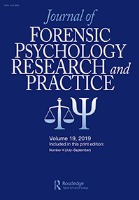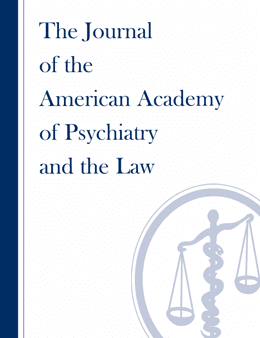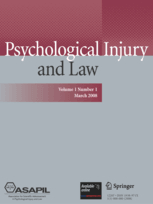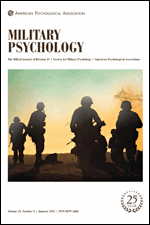
Journal of Forensic Practice
Scope & Guideline
Connecting Disciplines for Enhanced Forensic Solutions
Introduction
Aims and Scopes
- Forensic Psychology and Assessment:
The journal emphasizes research that explores psychological assessments and interventions within forensic settings, including evaluations of mental health disorders in offenders and the development of assessment tools. - Mental Health and Criminal Justice:
A core focus is on the relationship between mental health and criminal behavior, including studies on the experiences of individuals in secure mental health facilities and the impact of mental illness on offending. - Rehabilitation and Desistance:
The journal highlights research on rehabilitation programs, the processes of desistance from crime, and factors influencing successful re-entry into society, particularly for those with a history of offending. - Victims and Offenders:
Research that examines the psychological and social dynamics between victims and offenders, including restorative justice practices and victim empathy, is a significant theme. - Innovative Interventions:
The journal features studies on innovative therapeutic and rehabilitative approaches in forensic settings, including mindfulness, trauma-informed care, and the use of animal-assisted interventions.
Trending and Emerging
- Impact of the COVID-19 Pandemic:
Recent publications increasingly focus on the effects of the COVID-19 pandemic on mental health services, prison environments, and the experiences of both staff and patients, highlighting the need for adaptive practices in forensic settings. - Trauma-Informed Care:
There is a growing emphasis on trauma-informed approaches in forensic practice, with research exploring how understanding trauma can improve treatment and rehabilitation outcomes for offenders. - Youth Offending and Vulnerability:
Emerging studies are paying more attention to youth offenders, particularly those with vulnerabilities such as autism spectrum disorder and mental health issues, reflecting a trend towards understanding the unique needs of younger populations. - Restorative Justice Practices:
Research into restorative justice is gaining traction, with studies examining its effectiveness and the perceptions of those involved, including volunteers and victims, suggesting a shift towards more holistic approaches to justice. - Mental Health in Correctional Settings:
A notable trend is the exploration of mental health issues within correctional environments, including the experiences of prison staff and the implementation of mental health interventions, indicating a comprehensive approach to well-being in these settings.
Declining or Waning
- Traditional Crime Theories:
There is a noticeable decline in the publication of research focused on classical criminology theories. Instead, the journal is moving towards more contemporary and integrative approaches that consider psychological and social factors. - Generalized Offender Profiles:
Research centered around broad offender profiling techniques appears to be waning. The journal is increasingly favoring more nuanced studies that consider specific contexts, such as mental health status and individual experiences. - Cybercrime and Technology-related Offenses:
Although still relevant, there has been a reduction in the number of studies specifically addressing cybercrime and technology-related offenses, possibly indicating a shift towards more traditional forms of offending in the current research landscape.
Similar Journals

Journal of Forensic Psychology Research and Practice
Bridging Theory and Practice in Forensic Psychology.Journal of Forensic Psychology Research and Practice is a distinguished publication within the fields of Applied Psychology and Pathology and Forensic Medicine, published by Routledge Journals, Taylor & Francis Ltd. With a commitment to advancing knowledge from 2017 to 2024, this journal aims to bridge theory and practice by showcasing empirical research, including case studies and innovative methodologies, that address the complexities of forensic psychology in contemporary settings. While it holds a respectable Q3 ranking in both Applied Psychology and Pathology and Forensic Medicine, making it a vital resource for scholars and practitioners alike, its insights contribute significantly to understanding the psychological aspects of criminal behavior and legal processes. Researchers, professionals, and students are encouraged to engage with its content to further their understanding and application of forensic psychology principles in real-world scenarios.

Psychology and Law
Exploring the nexus of psychological insight and legal practice.Psychology and Law, published by Moscow State Psychological & Pedagogical University, is an open-access journal dedicated to advancing knowledge at the intersection of psychology and legal studies. Since its establishment in 2011, the journal has provided a platform for high-quality research that addresses critical issues in applied, clinical, experimental, cognitive, and social psychology. Despite ranking in the Q4 quartile for various psychology categories in 2023, this journal remains committed to fostering insightful discussions and contributions to the field. Researchers and practitioners from diverse backgrounds are encouraged to explore its accessible content, which aims to enhance our understanding of psychological principles within legal contexts. The journal's ISSN is 2222-5196, and it primarily serves an international audience, promoting scholarly engagement and interdisciplinary collaboration. As the field evolves, Psychology and Law continues to be a vital resource for those seeking to bridge the gap between psychological research and legal practice.

International Journal of Forensic Mental Health
Exploring the Nexus of Forensic Science and Mental HealthThe International Journal of Forensic Mental Health is a prominent platform for scholarly discourse in the intersecting realms of forensic science, psychiatry, and mental health. Published by Routledge Journals, Taylor & Francis Ltd in the United Kingdom, this journal boasts an ISSN of 1499-9013 and an E-ISSN of 1932-9903. It serves as a critical resource for researchers, clinicians, and students aiming to explore the complexities of mental health within forensic contexts. With a publication span from 2002 to 2024, the journal has secured its place in Q3 quartiles for both Pathology and Forensic Medicine, as well as Psychiatry and Mental Health, showcasing its contribution to advancing knowledge in these vital areas. The journal is indexed in Scopus, with respectable rankings that reflect its importance and reach: 18th out of 45 in Psychiatric Mental Health and 103rd out of 208 in Pathology and Forensic Medicine. While not currently offering Open Access, it continues to provide valuable insights and research findings that significantly impact clinical practices and forensic policies worldwide.

JOURNAL OF THE AMERICAN ACADEMY OF PSYCHIATRY AND THE LAW
Exploring the Nexus of Mind and LawJOURNAL OF THE AMERICAN ACADEMY OF PSYCHIATRY AND THE LAW, published by the American Academy of Psychiatry and Law, is a pivotal resource for researchers and professionals engaged in the intersection of mental health, law, and forensic evaluation. With an ISSN of 1093-6793 and an E-ISSN of 1943-3662, this journal has been at the forefront of disseminating critical findings and discussions since 1997, now extending through 2024. Positioned within the Q3 category for Medicine (miscellaneous), Pathology and Forensic Medicine, and Psychiatry and Mental Health, it highlights its significance within these disciplines. Although the journal currently operates under a traditional access model, it remains a valuable platform for scholarly articles that inform practice and elevate understanding of legal psychiatry. Researchers are encouraged to explore its contents to stay abreast of contemporary issues and advancements in forensic psychiatry, making it an indispensable resource for education and practice.

Psychology Research and Behavior Management
Empowering professionals with cutting-edge findings.Psychology Research and Behavior Management is a leading peer-reviewed journal that serves as a vital resource in the field of psychology and mental health. Published by DOVE MEDICAL PRESS LTD since 2008, this open access journal allows for the free dissemination of knowledge, ensuring that valuable research findings are accessible to a global audience. With an impact factor that positions it within the Q2 category in both Psychiatry and Mental Health as well as in Psychology (miscellaneous), the journal is recognized for its significant contribution to the understanding of behavioral management and psychological health. Its rankings—#61 out of 216 in General Psychology and #222 out of 567 in Psychiatry and Mental Health—further highlight its influence within these critical fields. By providing an avenue for innovative research and insights, Psychology Research and Behavior Management aims to support researchers, professionals, and students in exploring and addressing complex psychological issues, ultimately fostering informed practices and advancements in mental health care.

Psychological Injury & Law
Navigating the Intricacies of Law and Mental WellnessPsychological Injury & Law, published by SPRINGER, stands at the forefront of interdisciplinary research, merging insights from the fields of law, psychology, and mental health. With an ISSN of 1938-971X and an E-ISSN of 1938-9728, this esteemed journal aims to address the complexities of psychological injuries within legal contexts, providing a platform for scholars to explore the intersection of legal principles and psychological well-being. Recognized for its rigor, it has achieved a Q1 ranking in both Ecology and Law, and a Q2 ranking in Psychiatry and Mental Health for 2023, demonstrating its influence and contribution to these fields. Additionally, with impressive Scopus ranks placing it in the 95th percentile within Social Sciences (Law) and the 70th percentile in Medicine (Psychiatry and Mental Health), the journal consistently showcases high-quality, impactful research that resonates with professionals, academics, and students alike. By fostering a deeper understanding of psychological injuries, it serves as an essential resource for those seeking to navigate the intricate relationships between mental wellness and legal frameworks.

PSYCHOLOGY CRIME & LAW
Bridging Disciplines: Where Psychology Meets LawPSYCHOLOGY CRIME & LAW, published by Routledge Journals, Taylor & Francis Ltd, is a premier academic journal dedicated to the intersection of psychology, criminology, and the law. With an ISSN of 1068-316X and an E-ISSN of 1477-2744, this journal provides a critical platform for the dissemination of cutting-edge research and innovative methodologies in the fields of psychology, forensic medicine, and legal studies. Spanning over three decades (1994 to 2024), it holds impressive Scopus rankings, placing it in Q1 and Q2 quartiles for its contributions to law and forensic medicine, highlighting its standing within the academic community. PSYCHOLOGY CRIME & LAW is particularly noted for addressing contemporary issues at the crossroads of human behavior and legal standards, making it essential reading for scholars, practitioners, and students alike. While the journal is not open access, it offers valuable insights into a variety of topics, from criminal psychology to the implications of mental health in legal contexts, ensuring that it remains an influential resource for those engaged in research and professional practice.

Clinical Psychologist
Advancing the Science of Clinical Psychology.Clinical Psychologist, an esteemed journal published by TAYLOR & FRANCIS LTD, has been at the forefront of advancing the field of clinical psychology since its inception in 1996. With a dedicated focus on empirical research, theoretical discussions, and practical applications, this journal aims to bridge the gap between science and practice in psychology. Holding a notable impact factor and currently ranked in the Q3 quartile for 2023 in Clinical Psychology, it serves as a vital resource for researchers, professionals, and students alike, fostering the exchange of knowledge and innovative ideas. While the journal does not offer open access, its reputable publisher ensures a rigorous peer-review process, elevating the quality and relevance of each published article. Through its comprehensive scope, Clinical Psychologist remains committed to addressing pressing issues in mental health, making it an essential platform for the ongoing development and dissemination of psychological science.

MILITARY PSYCHOLOGY
Innovating approaches to resilience in armed forces.MILITARY PSYCHOLOGY is a premier journal dedicated to advancing the understanding of psychological principles as they apply to military settings and contexts. Published by ROUTLEDGE JOURNALS, TAYLOR & FRANCIS LTD, this esteemed journal has been at the forefront of military psychological research since its inception in 1990. With an ISSN of 0899-5605 and E-ISSN 1532-7876, it serves as a valuable resource for researchers, professionals, and students alike. The journal is classified in the Q3 quartile for both Experimental and Cognitive Psychology and Psychology (miscellaneous) in 2023, highlighting its significance in the broader psychological landscape. Additionally, it holds a commendable ranking within the social sciences, underscoring its relevance and influence in understanding psychological dynamics within military environments. Although it currently does not offer open access, the journal provides a wealth of insights into critical topics such as stress and resilience, operational effectiveness, and the mental well-being of service personnel, making it an essential read for anyone engaged in this pivotal field of study.

Journal of Police and Criminal Psychology
Advancing Insights in Criminal Behavior and Law EnforcementThe Journal of Police and Criminal Psychology, published by Springer, is a leading scholarly periodical that explores the intricate intersections of psychological principles and law enforcement practices. Founded in 1985, this esteemed journal serves as an essential resource for researchers, practitioners, and students alike, addressing contemporary issues in applied psychology and law, and has achieved a commendable position in its field, with a 2023 Scopus ranking of #128 in Law and #123 in Applied Psychology. With an impressive impact factor, it reflects the journal's commitment to advancing knowledge and fostering dialogues surrounding criminal behavior, law enforcement strategies, and psychological assessments. The journal maintains a non-open access model, ensuring rigorous peer-review standards while reaching a global audience interested in the psychological dimensions of criminal justice. As it continues to converge into 2024, the Journal of Police and Criminal Psychology remains dedicated to fostering groundbreaking research and facilitating critical insights that inform policy and practice in police psychology.